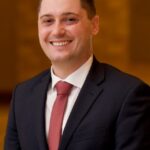Pittsburgh’s Tax on Visiting Athletes, Entertainers May Be on Last Leg by Luke Lucas, CPA
Posted on March 13, 2024
by
Luke Lucas
Professional athletes and entertainers, like most taxpayers, must learn to navigate the often-treacherous federal tax code and a broad range of differing tax laws at the state and local level that can increase their tax liabilities and eat into their hard-played earnings. For athletes and entertainers who travel across the country for games and performances, however, an additional tax burden is often imposed on their earned income by the jurisdictions where they are paid to play and perform.
This jock tax applies to the salaries of entertainers, athletes, coaches and other support personnel while performing outside their home states. In 1991, it made national headlines when players with the Chicago Bulls learned they owed state income taxes in California for the days they spent playing the LA Lakers in the NBA Finals. In direct response, the Bulls’ home state of Illinois announced it would assess taxes on athletes from other states where the jock tax is levied.
Today, most jurisdictions with state income taxes levy a jock tax on out-of-state athletes and entertainers who work and earn income within their borders. Sometimes, these taxes are also imposed by local cities within a state. While the tax can amount to hundreds of thousands of dollars and a significant number of state and local income tax filings, its constitutionality has occasionally been the subject of litigation in various jurisdictions, most recently in Pittsburgh.
The city of Pittsburgh levies a 1 percent earned income tax on its residents and a 2 percent school district tax. Since 2005, it also has assessed a 3 percent nonresident facility usage fee on the income earned by athletes and entertainers who travel to the city to perform at its publicly funded venues, including, but not limited to, the Pittsburgh Steelers’ Acrisure Stadium, the Pirates’ PNC Park and the Penguins’ PPG Paints Arena. This jock tax applies not only to out-of-town athletes on opposing teams but also to Pittsburgh’s very own team players who live outside the city limits and commute from the suburbs to practice, play and perform at its facilities.
In 2019, a lawsuit was filed against the city, arguing that the Pittsburgh non-resident facility usage fee violates the state’s constitution because it does not apply equally when compared to the 1 percent income tax on the city’s residents and non-residents who work in the city. Note that the city’s 2 percent school district tax is expressly prohibited against any persons who do not reside in the school district. The trial court agreed, stating that the facilities fee “is a tax in function” that “presents a discriminatory burden on out-of-state residents, with no like tax levied upon Pittsburgh residents.” The city appealed and continued to collect the fee until an appellate court upheld the lower court’s decision in January 2024.
Now, as the city deals with significant budgetary challenges and the issue of potentially refunding millions of dollars in collected fees, it is calling on the state Supreme Court to hear the matter while it stops collecting the tax. Whether the court will take up the matter is unclear. In the meantime, athletes and performers who have been subjected to the tax should explore the filing of protective refund claims to maximize their potential benefit, as the statute of limitations for requesting a refund is three years from the time the tax was paid.
About the Author: Luke Lucas, CPA, is an associate director of Tax Services with Berkowitz Pollack Brant Advisors + CPAs, where he helps businesses and their owners throughout the country maintain compliance with a complex maze of state and local tax issues. He can be reached at the CPA firm’s Miami office at (305) 379-7000 or info@bpbcpa.com.
← Previous
